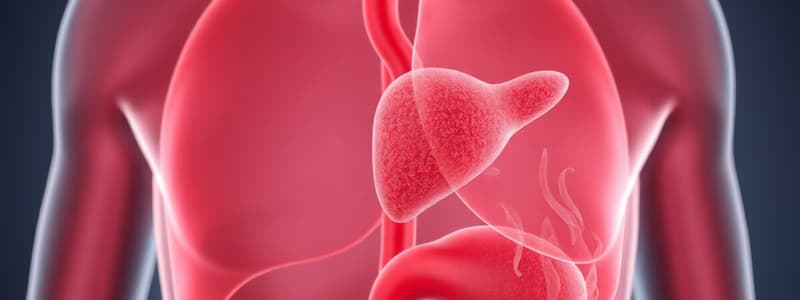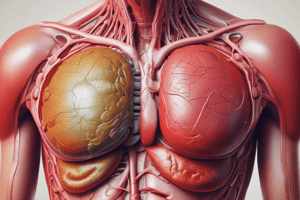Podcast
Questions and Answers
What is one of the vital products produced by the liver, and what is its primary function?
What is one of the vital products produced by the liver, and what is its primary function?
Bile is a vital product of the liver, and its primary function is to help break down fats, destroy microbes, and neutralize stomach acid.
Describe the role of hepatocytes in the liver.
Describe the role of hepatocytes in the liver.
Hepatocytes are cells in the liver that convert toxic waste products into bile, acting like an eco-friendly treatment plant.
What happens to bile after it is produced in the liver?
What happens to bile after it is produced in the liver?
After bile is produced in the liver, it is funneled into the gallbladder, where it is stored before being released into the intestine.
Explain why it is important to keep the liver healthy.
Explain why it is important to keep the liver healthy.
What substances produced by the liver help with digestion?
What substances produced by the liver help with digestion?
What are the two main blood vessels that supply the liver, and what does each deliver?
What are the two main blood vessels that supply the liver, and what does each deliver?
Describe the role of the liver in processing carbohydrates.
Describe the role of the liver in processing carbohydrates.
What happens to leftover nutrients in the liver?
What happens to leftover nutrients in the liver?
How does the liver deal with toxins found in the blood?
How does the liver deal with toxins found in the blood?
What are lobules and what role do they play in the liver's functions?
What are lobules and what role do they play in the liver's functions?
In addition to processing nutrients, what are some substances the liver manufactures?
In addition to processing nutrients, what are some substances the liver manufactures?
Why is the liver considered a crucial organ in the human body?
Why is the liver considered a crucial organ in the human body?
What are the main functions of the liver mentioned in the content?
What are the main functions of the liver mentioned in the content?
Flashcards
Bile
Bile
A bitter greenish liquid produced by the liver, stored in the gallbladder, and released into the small intestine to help digest fats, neutralize stomach acid, and eliminate toxins.
Hepatocytes
Hepatocytes
Cells in the liver responsible for converting toxic waste products into bile.
Gallbladder
Gallbladder
A small pouch connected to the liver that stores bile before it is released into the small intestine.
Fat Digestion
Fat Digestion
Signup and view all the flashcards
Liver Health
Liver Health
Signup and view all the flashcards
What is the liver?
What is the liver?
Signup and view all the flashcards
How does the liver receive blood?
How does the liver receive blood?
Signup and view all the flashcards
What does the liver do with blood from the intestines?
What does the liver do with blood from the intestines?
Signup and view all the flashcards
How does the liver process carbohydrates?
How does the liver process carbohydrates?
Signup and view all the flashcards
How does the liver handle excess nutrients?
How does the liver handle excess nutrients?
Signup and view all the flashcards
What does the liver do with harmful substances?
What does the liver do with harmful substances?
Signup and view all the flashcards
What are some of the liver's manufacturing functions?
What are some of the liver's manufacturing functions?
Signup and view all the flashcards
Why is the liver so important?
Why is the liver so important?
Signup and view all the flashcards
Study Notes
Liver Function: A Detailed Look
-
The liver is the body's heaviest organ, weighing approximately 1.4 kilograms, and operates continuously (24/7).
-
It acts as both a storage depot, a manufacturing hub, and a processing plant for various bodily functions.
-
Liver failure would lead to organ system failure.
Blood Filtration: A Two-Way Street
-
The liver filters blood from two main sources:
- The hepatic artery delivers blood from the heart.
- The hepatic portal vein delivers blood from the intestines.
-
This double delivery provides nutrients and oxygen to the liver.
-
The blood from the intestines contains digested carbohydrates, fats, vitamins, and other nutrients.
Nutrient Processing and Storage
-
The liver processes carbohydrates into sugars, which the body uses for energy.
-
Excess nutrients are stored in the liver for later use as needed.
Processing of Toxins and Waste
-
The liver filters out toxins and waste products from the blood.
-
It converts harmful substances into less harmful ones or removes them from the body through the kidneys and intestines.
Liver Manufacturing Processes
-
The liver manufactures various essential components including:
- Blood plasma proteins which carry fatty acids and promote clotting.
- Cholesterol which supports hormone production.
- Vitamin D
- Substances crucial for digestion.
- Bile, a vital component for fat breakdown, microbial destruction, and neutralizing stomach acid.
-
Bile is produced by hepatocytes (liver cells), stored in the gallbladder, and released into the intestines to aid digestion.
-
Bile carries away other toxins and excess waste.
Liver Health: Importance of Maintenance
- Maintaining a healthy liver is essential, as it processes a tremendous volume of materials and is not designed to process extreme quantities of toxins.
Studying That Suits You
Use AI to generate personalized quizzes and flashcards to suit your learning preferences.




